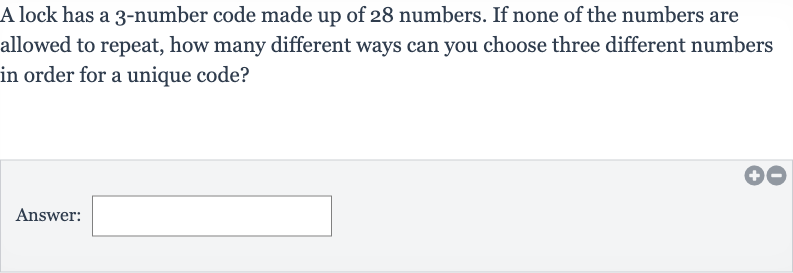Full solution
Q. A lock has a -number code made up of numbers. If none of the numbers are allowed to repeat, how many different ways can you choose three different numbers in order for a unique code?Answer:
- Calculate Factorials: We need to calculate the number of ways to choose different numbers from without repetition. This is a permutation problem because the order of the numbers matters for the code.The formula for permutations of items taken at a time is .Here, (total numbers) and (numbers in the code).
- Apply Permutation Formula: First, we calculate the factorial of , which is . However, we do not need to calculate the entire factorial. We only need the product of the first three terms because the rest will cancel out when we divide by .
- Simplify Calculation: Now, we calculate the factorial of , which is . Again, we do not need the entire factorial for because it will cancel out with the in the numerator.
- Perform Multiplication: We can now write the permutation formula as . The terms from in the denominator cancel out with the corresponding terms in the numerator after .
- Final Answer: After canceling, we are left with . Now we perform the multiplication: .
- Final Answer: After canceling, we are left with . Now we perform the multiplication: . The final answer is the number of different -number codes that can be made from numbers without repeating any numbers, which is .
More problems from Experimental probability
QuestionGet tutor help
QuestionGet tutor help
QuestionGet tutor help
QuestionGet tutor help
QuestionGet tutor help
QuestionGet tutor help
QuestionGet tutor help
QuestionGet tutor help
QuestionGet tutor help

